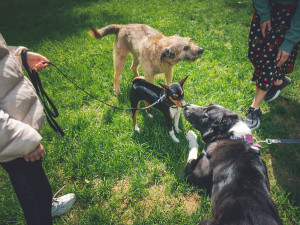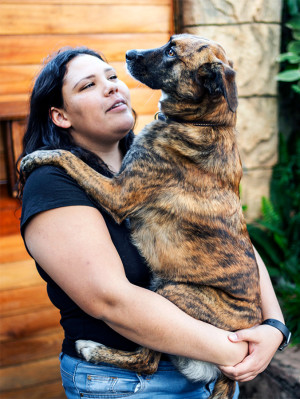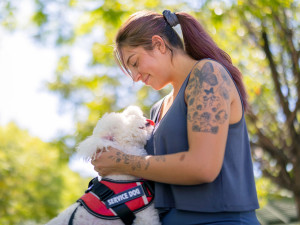Is Your Usually Upbeat and Silly Dog... Depressed?
Blue is a good name for a dog – not a good mood

Share Article
In May 2022, the World Health Organization stated opens in new tab that depression and anxiety had increased by 25 percent worldwide since the COVID-19 pandemic began and, as you’ll be aware, things haven’t exactly improved since then. When we humans are feeling down – physically or mentally, our dogs are there for us. They snuggle up to us, put their paws on our arms to console us, and are just generally silly when we need a laugh.
There is evidence to suggest opens in new tab that having a canine companion in your life can help reduce symptoms of stress, anxiety, loneliness, and depression in humans. But what about when our dogs start to seem down? Can they experience depression, too? Dr Lore I Haugopens in new tab, a board-certified veterinary behaviour specialist who works at the VCA Lexington Boulevard Animal Hospital in Texas, says: “most likely, yes.”
Dr Haug says that while there is no official depression diagnosis for dogs and cats, given the similarities to humans in their brain anatomy and neurochemistry, “it is reasonable to hypothesise that dogs do suffer depression in their own way.”
She adds that, because there is still so much about depression that we don’t understand –both in humans and in dogs – we can’t know for sure how our pets feel, or how they might experience depression. That being said, as long as you know what to look for, there are still ways to identify, prevent, and help alleviate symptoms of depression in dogs. Below, some tips from Dr Haug.
What are the signs of dog depression?
Like humans, if your dog is withdrawn, or doesn’t seem interested in the activities it usually loves (playing fetch, walking or even eating) that could be a sign that they are experiencing depression. Dr Haug is quick to underscore, however, that it’s important to rule out any potential physical ailments first.
“As there is overlap between behaviour changes in dogs with medical issues and ‘depression’, owners should always consult with a veterinarian before assuming their dog is depressed,” she says.
What can trigger depression in dogs?
Dr Haug says that depression – in both humans and research animals – is in large part a response to feeling like one lacks control over their environment. As she puts it: “the feeling that nothing you do matters or can change your situation.”
In the case of dogs, this means that when they feel like they have no control over their lives – like when and what they eat, where to walk and when and who they can play with – they may begin to experience feelings of helplessness that can lead to depression.
Hyper-controlling training styles can be similarly deleterious to the dog’s well-being, because, as Dr Haug says, “the dogs do not have any choice or ability to express their own wants and needs.”
Other potential triggers, according to the American Kennel Clubopens in new tab, include major changes to their environment and lifestyle, such as a big move, the loss of a human or animal companion, the introduction of a new baby or animal into the home, and social isolation.
Additionally, while experts don’t know whether depression is more common in certain breeds, dogs that experienced trauma or abuse may be more prone to it, and require extra care and stimulation to help them manage feelings of fear and anxiety.
What can you do to help a dog who seems to be experiencing depression?
As with most maladies, human or canine, the best treatment for depression in dogs is prevention. Learn what type of environment, food, exercise and mental stimulation is best for your dog, and provide it for them.
“Owners need to make appropriate breed choices for their living situation,” Dr Haug says. A busy university student in a tiny flat may love Labradors, she says, but that doesn’t mean they’re able to give them the attention, training, and exercise the breed needs to be happy and healthy.
If a dog is already showing symptoms of depression, and a veterinarian has ruled out any possible physical issues like pain or illness, Dr Haug recommends finding a professional behaviourist who can evaluate the dog and their living situation, and provide recommendations appropriate for that animal, family and home.
Ultimately, whether your dog has seemed down in the dumps recently or not, Dr Haug says it’s important to always make sure they receive adequate mental and physical stimulation, as well the necessary training and education to help both you and your pet better understand each other.
“Training classes are obligatory,” she says. “No dog should grow up ‘illiterate’!”

Madeleine Aggeler
Madeleine Aggeler is a freelance journalist and copywriter in Washington, D.C. Previously, she was a writer at New York magazine’s The Cut. She lives with her dog, Cleo, who works primarily as a foot warmer.
Related articles
![Man and golden retreiver laying on stomach looking at each other in bed]()
Dog Whimpering: Why a Dog’s Whimper Affects Us
To pet parents, a whimpering dog sounds as sad as a crying baby. Here’s why
![A dog laying on a couch looking relaxed]()
Is Your Dog Sad?
Or are they just peacefully resting? Behaviourist Karen London explains how to tell the difference
![Pet parent comforting anxious dog by holding their paw]()
8 Tips for Helping an Anxious Dog
Easy ways to calm your pup’s nerves
![Young woman holding her large dog in her arms outdoors.]()
What to Do When Your Dog Is Even More Anxious Than You Are
Did you get a dog for emotional support and now they are the one who needs it?
![dog wearing service dog tabard jumps up at girl with brown hair and tattoos]()
How Psychiatric Assistant Dogs Help Their Humans
“A PAD can be life-changing – and even life saving”
![Golden Retrieve dog running in the grass outside, playfully chasing a flirt pole held by a man in blue jeans]()
Your Dog Is Bored. Here’s How to Solve That
Get out the toys and puzzles








